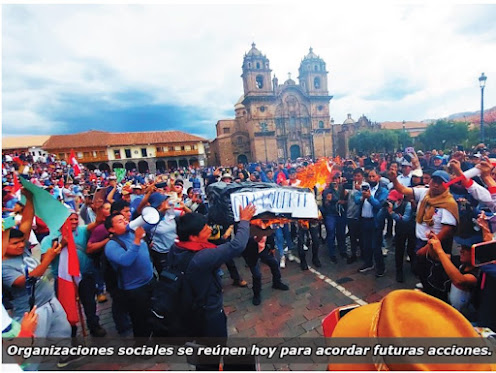Peru dispatch: ‘The policemen were throwing many tear gas canisters, and they were also pushing the protesters’ (JURIST - 12/22/2022)
Anjana Meza, JURIST’s staff correspondent at the Pontifical Catholic University of Peru in Lima, forwards this eyewitness account of recent protests in Arequipa from a law student at the Universidad del Pacífico who was visiting southern Peru earlier this month when Peru’s Congress removed President Pedro Castillo, who had attempted to unconstitutionally dissolve the legislature. Dina Boluarte, Castillo’s Vice President, was subsequently sworn into office. Protests have continued as Boluarte, herself a controversial figure, attempts to quell tensions by moving up the date of national elections and reshuffling her cabinet. Last week the government declared a 30-day state of emergency.
I went to Arequipa a few weeks ago since my family is from here and I wanted to take advantage of the time before going back to work. I had thought of staying just a few days. But I went through the entire political crisis around those dates. I remember that on December 7, I was walking through the Arequipa Plaza when Castillo decided to dissolve the congress. The people were surprised, but they thought that everything would be calm. Then the situation became complicated when Congress decided to vacate Castillo and when Dina Boluarte was sworn in. This situation was chaotic, especially when trying to leave the city of Arequipa. In the city itself, there were not many riots – the strongest riots were outside the city. To be calmer and more protected, my family and I decided to stay in the city of Arequipa.
During the days after December 7, I stayed at my grandparents’ house with my family, waiting for the whole crisis to pass. However, it was not possible. I had a work meeting scheduled in Puno, which is another department of Peru, for December 14. So, I was forced to leave the city of Arequipa. My flight was cancelled since the protesters had taken over the airport and for safety reasons all the airlines suspended their flights until further notice. For this reason, I had to resort to another means of transport. There were no buses that provided the transportation service, there were only cars and since I needed transportation, I had to travel by hired car. However, I was unable to complete my journey as the roads were blocked. Unfortunately, I had to be at the scene of the protests. I remember that when we were leaving Arequipa towards Puno, we met a group of protesters. We had to get out of the car, and I took the opportunity to talk a little with the other passengers in the car who became my friends. They told me that the situation was terrible because they were fruit merchants and their businesses had been affected because everything was blocked. (more)




Comments
Post a Comment